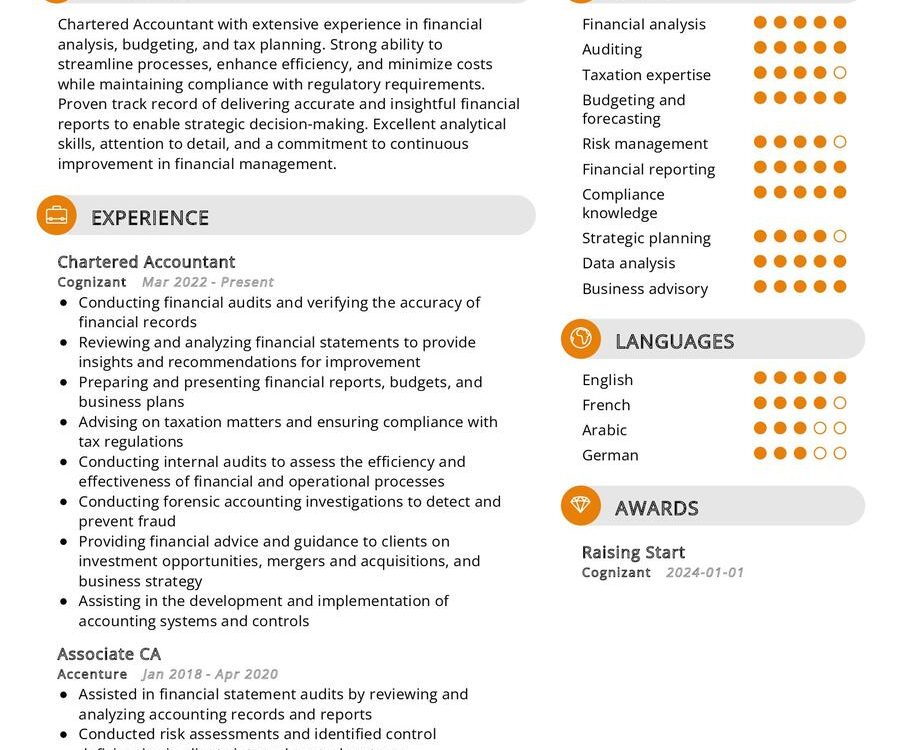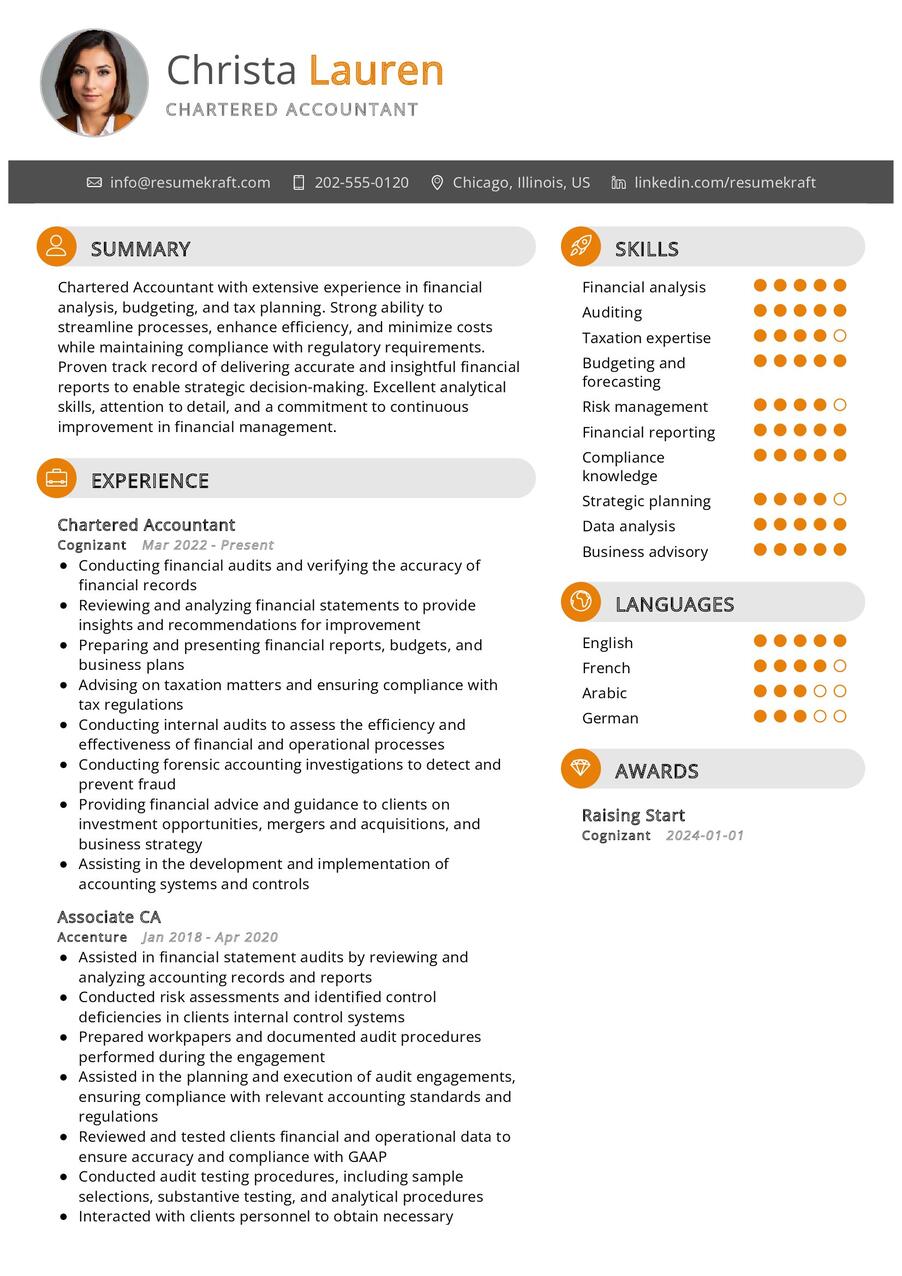Exploring the Role of a Chartered Accountant
As the financial landscape continues to evolve, the role of a Chartered Accountant has become increasingly vital in organizations globally. This position requires a unique blend of financial expertise, strategic thinking, and adherence to regulatory standards. Let’s dive into the multifaceted role of a Chartered Accountant, a profession that demands a deep understanding of financial principles coupled with the ability to provide valuable insights to guide organizations towards fiscal success.
Job Requirements for Chartered Accountants
Embarking on the journey of becoming a Chartered Accountant entails meeting stringent requirements, a path that is both challenging and rewarding. Here’s a closer look at the prerequisites one needs to fulfill to embrace the role:
- A Bachelor’s or Master’s degree in Accounting, Finance, or a related field, showcasing a strong foundation in financial principles.
- Successful completion of the Chartered Accountancy program, demonstrating a comprehensive understanding of accounting standards and practices.
- Experience in financial analysis and reporting, showcasing a trajectory of increasing responsibility in previous roles.
- Excellent analytical and problem-solving skills, honed through practical experiences and possibly through specialized courses and certifications.
- Proficiency in financial software and tools, with a keen eye for detail in auditing and compliance.
- Strong communication skills, both written and verbal, to effectively convey financial information to stakeholders.
- Adaptability and resilience, crucial traits in navigating the dynamic and ever-changing financial landscape.
Continuing professional education and obtaining additional certifications in finance and accounting can further enhance your profile in the competitive job market.
Responsibilities of a Chartered Accountant
The role of a Chartered Accountant is a tapestry of diverse responsibilities, woven with threads of financial acumen, strategic thinking, and ethical conduct. Let’s unravel the core responsibilities that define this role:
- Conducting financial audits and ensuring compliance with accounting standards and regulations.
- Preparing financial statements and reports to provide accurate and timely information to management and stakeholders.
- Advising organizations on financial decisions, risk management, and strategic planning.
- Identifying cost-saving opportunities and areas for financial improvement within the organization.
- Collaborating with cross-functional teams to ensure financial goals align with overall business objectives.
- Staying updated on changes in financial regulations and accounting standards, guiding the organization in maintaining compliance.
- Guiding and mentoring junior accounting staff, fostering a culture of continuous learning and development.
Each responsibility comes with its unique challenges and learning opportunities, contributing to the growth of a skilled Chartered Accountant.
Chartered Accountant Resume Writing Tips
Crafting a resume as a Chartered Accountant requires strategic presentation of your skills and experiences. Here are some tips to help you showcase your expertise effectively:
- Highlight your experience in conducting successful financial audits, emphasizing the impact on organizational compliance.
- Detail instances where your financial advice contributed to strategic decision-making and improved financial performance.
- Include quantifiable achievements, such as cost-saving initiatives or successful financial projects, to showcase your impact.
- List relevant certifications, demonstrating your commitment to staying current with industry standards and regulations.
- Personalize your resume for each application, aligning your skills with the specific requirements of the job description.
Each tip is a brushstroke, helping you paint a compelling portrait of your skills and experiences as a Chartered Accountant.
Chartered Accountant Resume Summary Examples
Your resume summary is the opening act of your career story, setting the stage for what follows. Craft a powerful snapshot of your journey with examples like:
- “Dedicated Chartered Accountant with over 8 years of experience, adept at conducting precise financial audits and providing strategic financial guidance.”
- “Results-driven Chartered Accountant with a proven track record in cost-saving initiatives, contributing to improved organizational efficiency.”
- “Experienced Chartered Accountant specializing in risk management and compliance, guiding organizations through dynamic financial landscapes.”
Each summary is a window to your career, offering a glimpse of your journey, your strengths, and your vision as a Chartered Accountant.
Building a Strong Experience Section for Your Chartered Accountant Resume
Your experience section is the heart of your resume, pulsating with the rich experiences you have gathered over the years. Narrate your career story with examples like:
- “Led financial audit teams, ensuring 100% compliance with accounting standards and identifying areas for process improvement.”
- “Provided strategic financial advice that led to a 15% reduction in operational costs and improved overall financial performance.”
- “Mentored junior accountants, fostering a culture of continuous learning and development within the finance department.”
Each experience is a chapter in your career book, narrating tales of challenges met, solutions found, and successes achieved as a Chartered Accountant.
Education Section for Your Chartered Accountant Resume
Your educational journey is the foundation upon which your career stands. List your educational milestones with examples like:
- Master of Accounting, XYZ University, a comprehensive program that laid the groundwork for a successful career in finance, 2015.
- Bachelor of Finance, ABC University, the foundation stone of your financial expertise, 2012.
- Chartered Accountancy Certification, [Certifying Body], a recognition of your expertise in financial auditing and compliance, 2016.
Each educational qualification is a stepping stone, leading you to the pinnacle of success in your career as a Chartered Accountant.
Essential Skills for Chartered Accountants
Your skill set is your toolbox, equipped with a diverse range of tools that you have honed over the years. Showcase the essential skills that a Chartered Accountant should possess:
Soft Skills:
- Financial analysis and reporting, the ability to provide accurate and timely financial information.
- Strategic thinking, guiding organizations in making informed financial decisions.
- Communication skills, effectively conveying complex financial information to stakeholders.
- Leadership and mentorship, fostering a culture of continuous learning and development within the finance team.
- Attention to detail, ensuring precision in financial audits and compliance.
Hard Skills:
- Proficiency in financial software and tools, utilizing technology for efficient financial management.
- Knowledge of accounting standards and regulations, ensuring organizational compliance.
- Risk management, navigating dynamic financial landscapes with a focus on mitigating potential risks.
- Strategic financial planning, contributing to the overall success and growth of the organization.
Each skill is a tool, aiding you in providing exceptional financial guidance and leadership as a Chartered Accountant.
Common Mistakes to Avoid When Writing a Chartered Accountant Resume
As you craft your resume, steer clear of common pitfalls that can hinder your journey to landing your dream job. Here are mistakes often seen in resumes and how to avoid them:
- Avoid generic language and tailor your resume to highlight your unique fit for the role of a Chartered Accountant.
- Go beyond listing job duties and showcase your achievements, providing depth to your narrative.
- Don’t underestimate the importance of a cover letter; use it as an opportunity to connect with potential employers and showcase your personality.
- Balance technical jargon, ensuring that it enhances rather than obscures your true value as a Chartered Accountant.
- Always proofread your resume to maintain a professional image and avoid potential errors.
Avoid these mistakes to craft a resume that is both authentic and compelling as a Chartered Accountant.
Key Takeaways for Your Chartered Accountant Resume
As we conclude this comprehensive guide, remember these key points while crafting your Chartered Accountant resume:
- Emphasize your experience in financial audits and strategic financial planning, showcasing your impact on organizational success.
- Highlight your expertise in compliance and risk management, essential skills for navigating dynamic financial landscapes.
- Detail instances where your financial advice contributed to cost-saving initiatives and improved overall financial performance.
- Include a section on mentorship and leadership, demonstrating your commitment to continuous learning and development.
Finally, feel free to utilize resources like AI Resume Builder, Resume Design, Resume Samples, Resume Examples, Resume Skills, Resume Help, Resume Synonyms, and Job Responsibilities to create a standout application and prepare for the Chartered Accountant job interview questions.
Armed with these insights and tips, you are now ready to craft a resume that is a true reflection of your journey, your skills, and your aspirations. Remember, your resume is not just a document; it is a canvas where you paint your career story, a story of growth, learning, and financial leadership. Best of luck!


